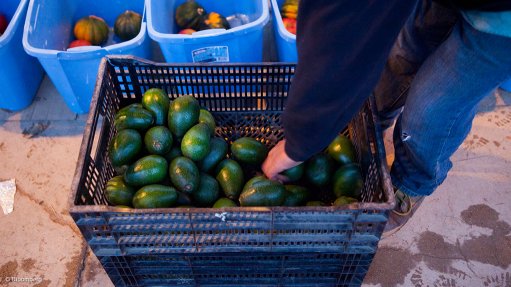
Photo by: Bloomberg
In January, for the second month in a row, South African food and non-alcoholic beverage (NAB) inflation (hereafter to be referred to as food inflation, for short) declined, in year-on-year terms, the Bureau for Food and Agricultural Policy (BFAP) has reported, in its latest ‘Food Inflation Brief’. Year-on-year food inflation in January ran at 7.2%; the figure for December had been 8.5%, and for November, 9%. January’s month-on-month food inflation was 0.6%. South Africa’s year-on-year consumer price index headline inflation figure in January was 5.3%, to which food inflation contributed 1.3 percentage points.
Loadshedding (scheduled rotating power cuts imposed by national electricity utility Eskom, due to lack of generating capacity) remained a persistent “challenge” to the country’s food and agriculture sector, noted the BFAP. The prices of electricity and “other fuels” had increased 15.2%, year-on-year, although the price of “fuel” had gone down by 5.2%, also year-on-year. Another external factor affecting the sector was the rand:dollar exchange rate, which had seen the rand depreciate by 10%, year-on-year, from R17.09:$1.00 to R18.79:$1.00.
The food categories and items which had suffered the highest year-on-year inflation in January were sugar-rich foods (18.5%), dairy and eggs (13%), vegetables (12.6%), fruit (10.2%), NAB (8.1%), bread and cereals (6.5%), fish (4.4%), and meat (2.2%). Oils and fats saw year-on-year deflation of -5.3%. In month-on-month terms, the highest inflation was experienced by fruit (1.4%), sugar-rich foods (0.9%) meat (also 0.9%), vegetables (0.7%), fish (0.6%), bread and cereals (0.5%), NAB (0.4%) and oils and fats (0.2%). Dairy and eggs recorded month-on-month deflation of -0.2%.
In year-on-year terms, the commonly bought food items with inflation equal to or greater than 30% were (in the BFAP’s order and categorisations) sweet potatoes, potatoes; oranges; and Ceylon/black tea. Those with inflation from 20% to just under 30% were rice, frozen potato chips, instant noodles; broccoli, pumpkin; avocados, pears, apples, papaya, bananas; eggs; whiteners; sugar; and instant coffee. Those food items with inflation from 10% to just under 20% were beetroot, tomatoes; pineapples; frozen fish fingers, frozen hake, corned beef; condensed milk, gouda cheese, cheddar cheese, powdered milk, yoghurt; peanut butter, canned baked beans; and rooibos tea. The food items which experienced year-on-year deflation in January were white bread; lettuce, spinach, onions; beef (chuck, mince, T-bone, stewing meat, brisket, fillet, rump steak, sirloin); pork (fillet, ribs, chops); mutton/lamb (neck, leg, rib chop, stewing meat); and sunflower and canola oil.
The cost of the BFAP’s Thrifty Healthy Food Basket (THFB) increased by 7.4%, or R337, year-on-year, and by 1.2%, or R3.37, month-on-month. The THFB is composed of 26 nutrionally-balanced food items from all the food groups, and is designed to feed a low-income reference family of two adults and one older and one younger child for a month. In January, buying the THFB would have consumed 32.5% of such a family’s income.